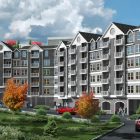Dan Radman
Affordable Housing: State Denies Town’s Claims in Response to ‘Declaratory Ruling’ Lawsuit
|
The state Department of Housing last week filed its formal answer to a lawsuit from the town of New Canaan, denying claims that it “aggrieved” the municipality last year when it issued a “declaratory ruling” after denying an application for relief from a widely discussed affordable housing law. The town claimed in a complaint filed last summer that the DOH misinterpreted the law known by its statute number, 8-30g, when the agency bolstered its reasoning for an earlier denial of the town’s application for a four-year “moratorium.”
Specifically, the town argued, the state erred in failing to credit New Canaan for “excess” affordable housing units that had been completed prior to the issuance of the town’s last moratorium (in 2017).
“In other words, if a municipality constructs a substantial number of affordable housing units, well in excess of the number of units that would be required for a moratorium under § 8-30g, and then the municipality applies for and receives a moratorium, none of the ‘excess’ or ‘surplus’ newly constructed affordable housing can ever be counted towards a later moratorium,” Nick Bamonte, a lawyer with the town attorney’s firm, said in the complaint.
In the Jan. 19 answer, Assistant Attorney General Vianca T. Malick denied the town’s claims that the DOH’s declaratory ruling prejudiced the rights of New Canaan, violated state law, abused its power or effectively discouraged the construction of affordable housing units, as the complaint had asserted. Under the state law known by its statute number, 8-30g, in towns where less than 10% of all housing stock qualifies as affordable (New Canaan is at 2.94%), developers who propose projects where a certain number of units are set aside to rent at affordable rates may appeal to the state after a local P&Z Commission denies their applications. New Canaan since its last moratorium lapsed in July 2021 has received three such applications, at Weed and Elm Streets (120 units, above Kimberly Place), Main Street (20 units) and Hill Street (93 units).


